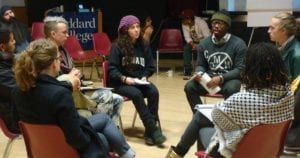 August Wilson’s Joe Turner’s Come and Gone, the first in his 10-decade cycle of plays chronicling African American life in the United States, takes place in a Pittsburg boarding house during the Great Migration, when African Americans left the slave plantations of the south and headed north to build new lives as free men and women. This transition out of oppression and into freedom, from property to personhood, required that every person undertake an act of creation— of their individual selves and, also, of their community. The only tool that was powerful enough to achieve this monumental task was The Word, or, as Wilson more eloquently put it, “the molding of one’s spirit into a song.”
August Wilson’s Joe Turner’s Come and Gone, the first in his 10-decade cycle of plays chronicling African American life in the United States, takes place in a Pittsburg boarding house during the Great Migration, when African Americans left the slave plantations of the south and headed north to build new lives as free men and women. This transition out of oppression and into freedom, from property to personhood, required that every person undertake an act of creation— of their individual selves and, also, of their community. The only tool that was powerful enough to achieve this monumental task was The Word, or, as Wilson more eloquently put it, “the molding of one’s spirit into a song.”
From the moment the play starts, the characters engage in this ritual act of bringing themselves into existence via speaking, singing and making music. We listen to Bynum chanting over pigeons in the backyard, or Jeremy playing guitar in cutting contests at the local tavern, or Seth, the play’s percussion section, beating a piece of scrap metal until it turns into a usable pot or pan while the boarding house residents sit around the kitchen table and talk. Or, I should say, incant, because they’re not just shooting the breeze around that table; their words are incantations. Through speaking, they are summoning themselves and their community into being.
Fairly quickly something miraculous starts to happen: the words that are spoken or sung by the different characters begin to physically manifest on stage. The change is not dramatic or theatrical; in fact, it’s barely noticeable. I didn’t see these things myself until I had read the play a few times. But not too long after Bynum’s glorious monologue about the Shiny Man, a fellow by the name of Harold Loomis arrives. (Harold is later revealed to be the Shiny Man.) Jeremy’s conversation about desperate women summons Mattie, a desperate woman. And the boarding house’s Saturday night entertainment, the juba, a call and response song from Africa, erupts into Wilson’s famous “bone’s rising out of the water” scene that transforms the death of the middle passage into something living and breathing. From language, we witness a complete resurrection. Flesh mysteriously appears on bones. The Word, it is revealed, is powerful stuff, powerful enough to bring the dead back to life.
The entire play is built on this invisible structure of call and response. The call is the spoken word. The response is flesh. The word made flesh. It is tied to the Yoruban concept of Nommo, which loosely translated means: “speaking makes it so.” Nommo is also a Dogon word from Mali that refers to the power of words to create reality and build community. You will also find this idea in the book of Genesis.
So, what does this have to do with Donald Trump? The impetus for this keynote was his election to the White House, and the need for the writing community to respond in some way.
I started this keynote with August Wilson because there is an important lesson for all of us in Joe Turner’s Come and Gone about how to respond to the current situation. And it is this: there is a tool that is stronger than repression. It is The Word. The power of language. Or, as Wilson says, the “song inside you.” And it is a tool that all of us in this room possess.
But Donald Trump has this tool too. He also has words—toxic words that lie and distort—and we are beginning to see the horrible things those words are bringing into the world. How do our words, or what August Wilson calls “the songs inside us” have any power next to words like that?
I’m going to travel to three repressive regimes for some clues: to the former Soviet Union; to Czechoslovakia before the fall of the Iron Curtain; and to South Africa during the era of apartheid. In each of these places, language was tightly controlled by the respective regimes. In each place, language was used to lie and distort. And in each place, the language of song lyrics, plays and literature helped to liberate those countries from repression.
I will start with Russia, since it is very much in the news these days. From 1922-1991 Russia, or the Soviet Union, was a totalitarian regime, ruled by a one-party system where the communist government regulated every aspect of life. Like all totalitarian regimes, language was tightly controlled.
The Soviet regime forced friends and neighbors to spy on each other and to report on what they were saying. The regime outlawed typewriters. They put speakers on telephone poles to broadcast government propaganda during the day. The news wasn’t news at all—it was fake. Propaganda. “Alternate facts.” Lies. False narratives of happy Soviet workers.
But the truth was very different. Life under the Soviet regime was hard. The country was economically depressed; everyone lived in fear; vigilantes roamed the streets. There was also an official culture that was imposed from above, with “approved” writers and stories. Everything from the west was prohibited. If you were caught with western books or music, you would be punished. In fact, several years ago I interviewed a musician in Prague who had been convicted of treason, and sentenced to hang, for listening to jazz music.
As one Russian said: “We were living in a monster state and we needed an alternative.”
And then, someone smuggled a bootleg copy of a Beatles album into the USSR. The album went viral, taking the country by storm, and turning tens of millions of young people to “another religion.” Suddenly, there was a great, big hole in the Iron Curtain.
“The Beatles opened up another life,” said one Russian citizen. “They were fresh air,”
“Beatles songs were sexy!” Someone else said. “They were fun!”
“When we listened to their music, we were free,” said another. “We stopped being Soviet slaves.”
The Beatles had succeeded, overnight, in destroying official Soviet culture. The government responded by clamping down. They sent vigilantes into the streets to beat up and shave the heads of anyone who wore their hair like the Beatles. If you were caught with a bootleg record, it was destroyed—and you went to jail, lost your job or were kicked out of the university.
It didn’t work. Russians loved Beatles songs more than ever.
The government then put out negative, fake news stories about the Beatles. They issued pictures of the Beatles wearing toilet seats around their necks. They claimed that Beatles music infected people with psychoses that made them violent and showed pictures of screaming girls as proof of what could happen if you listened to their songs.
The Beatles were considered more of a threat than nuclear missiles. This is not hyperbole. This was a statement made by one of the Soviet foreign ministers. When Gorbachev came to power he said that the Beatles had shown Russians that there “was another life,” and the Soviet Union quickly came to an end.
***
 This story repeated itself in the former Czechoslovakia, which was also behind the Iron Curtain. Language was controlled here, as well, just like in Russia. However, in Czechoslovakia, it wasn’t Beatles music that liberated the nation, it was the stage plays of Vaclav Havel.
This story repeated itself in the former Czechoslovakia, which was also behind the Iron Curtain. Language was controlled here, as well, just like in Russia. However, in Czechoslovakia, it wasn’t Beatles music that liberated the nation, it was the stage plays of Vaclav Havel.
Havel was the playwright who would later become President; he, along with a group of theatre artists, orchestrated the end of Soviet rule in the Velvet Revolution, the world’s first bloodless revolution that was fully dramaturged.
Under the Soviet occupation, everyone in Czechoslovakia went to the theatre. Havel’s plays, which were mostly comedies, were the most popular of all. They put forth a simple idea: what Havel called “Living in Truth.” It entailed finding your inner truth and then speaking it. It’s the same thing as August Wilson’s idea of “finding your song and singing it.”
This was a very dangerous idea to the authorities who understood what August Wilson understood: that words have the power to put flesh on bones. “Living in Truth,” by definition, meant exposing the lies of the regime. The authorities promptly banned Havel’s plays from the stage and sentenced him to seven years of hard labor for writing them.
Havel, however, continued to write, hiding his plays in a tree trunk in the back yard when he wasn’t in jail and having them secretly typed into what was called a “samizdat” text. This is how prohibited novels, poems, plays and books were reproduced and distributed behind the Iron Curtain.
Samizdat texts were made by typing a manuscript or book on to sheets of onion skin paper, separated with carbon paper. Each typing could yield eight copies. Often, a samizdat would be written by hand, because typewriters were outlawed in Czechoslovakia and were hard to come by. It was very dangerous to make a samizdat. There were harsh punishments—jail time, hard labor—if you were caught making one, or having one in your possession.
Samizdat copies were passed hand to hand. They were also smuggled out of the country. Vaclav Havel’s plays were hand-carried to the Public Theatre in New York and to the Orange Tree Theatre in London, both of whom produced them, not only because the plays were good, but to let the Soviet regime know that the world knew all about Havel, who, at that time, was behind bars.
This is how Havel was kept alive. This is also how Czech culture was kept alive. Through samizdat and through the theatre, where the Czech people developed a secret language—a code—that was based in metaphor and literary references, that escaped the notice of the censors. Havel later used this language, the tools of the stage, and the idea of “Living in Truth” to lead his nation to freedom during the Velvet Revolution.
***
 Song lyrics and music also provided the fuel for the anti-apartheid movement in South Africa. A little-known Mexican American singer named Sixto Rodriguez, who sang in smoke-filled, backroom bars in Detroit, Michigan, made an album titled Cold Fact. It was filled with anti-establishment songs about the angst of living, written in a stream-of-consciousness style that had lots of drug references. The album was a failure in the US.
Song lyrics and music also provided the fuel for the anti-apartheid movement in South Africa. A little-known Mexican American singer named Sixto Rodriguez, who sang in smoke-filled, backroom bars in Detroit, Michigan, made an album titled Cold Fact. It was filled with anti-establishment songs about the angst of living, written in a stream-of-consciousness style that had lots of drug references. The album was a failure in the US.
Someone smuggled a bootleg copy of Cold Fact into South Africa early in the 1970’s, at a time when the apartheid regime was tightening its grip. Rodriguez’s song—and his status as an outsider in America—resonated with Afrikaners, whose country was becoming increasingly repressive. The government banned the record, which only added to its cult status. Illegal copies were produced and the album went viral. Everyone knew the words by heart. Cold Fact quickly became the anthem of the white resistance movement in apartheid-era South Africa. To this day, Rodriguez is a household name there.
***
Obviously, the demise of these three repressive regimes were complex historical and political events that had many facets and dimensions. I don’t mean to oversimply them. But the spark for the demise, in each instance, came from songs, plays and books, which ignited the hearts and souls of their people so strongly that the regimes could not extinguish the flames. These works spread like wild fire and the regimes were reduced, in the end, to ash.
What was it about those songs, plays and books that gave them this kind of power?
The first thing they had in common was that they were all noticeably absent of political content. This is not to say that there wasn’t a political impact. There was. There was a huge impact. There always is—whether the author intends one or not. But these songs and plays didn’t address the “issues of the day.” They didn’t take on political subjects. As one Russian said, what was great about Beatles songs is that “they made us forget the stupidity of politics.”
Here are what the Beatles were singing: “I wanna hold your hand.” “She loves you yeah, yeah, yeah.” “We all live in a yellow submarine.”
What did Havel write? Playful comedies about hope, bad luck, joy and eternity. In one of his most popular plays, The Memorandum, the characters speak ptydepe—a language he invented with sounds and words that had no meaning at all.
Rodriquez wrote drug-induced poetry: “Silver magic ships, you carry, jumpers, coke, sweet Maryjane.”
Here are the lyrics from his song that became the resistance anthem for the anti-apartheid movement:
I wonder how many times you’ve been had
And I wonder how many dreams have gone bad
I wonder how many times you had sex
And I wonder do you know who’ll be next?
I wonder, I wonder.
Wonder I do
Not exactly political. And yet, all of these works ignited massive political movements and change.
The second thing that these works had in common was that they didn’t have a political purpose. They were not written as protests or aimed against any regime. They were simply giving voice to things like beauty, love, hope, despair, truth, life, death, and joy.
The Russians didn’t listen to the Beatles as a form of protest either. They were simply responding to work that was authentic and truthful—that had life. The Czechs went to Havel’s plays, often performed in secret, because the plays made them laugh, and “touched the deepest nerve of human existence.” The South Africans liked Rodriquez’s songs because the songs made them happy and gave them joy.
The final thing these works had in common was that they all prompted responses that can only be described as spiritual, and in some cases, religious.
Russians refer to Beatles music as sacred. People said things like, “My soul took flight.” “They set my spirit free.” “They were vitamins for the soul.”
The Czechs described Havel’s plays in spiritual terms: “His plays touched what was essential in us; they set our drowsy souls moving.”
Rodriquez was called a “savior.” McCartney and Lennon were called saviors too. The day Paul McCartney finally performed in Moscow was considered a Holy Day and his concert was treated like a religious ceremony.
I understand the response. When I interviewed the musician that had been sentenced to death for listening to jazz music, I asked him if he had any samizdat. He did and he allowed me to hold one. Carefully. I’ll never forget the way he handed it to me. I felt like I was a congregant in church, taking communion. When he placed it in my hands, I was moved to tears that this manuscript—made of onion skin and weighing little more than a feather—had so much power that it kept a culture alive and saved an entire nation.
Holy, or sacred, are the only words that begin to capture it.
This is the power of art. This is the power of words.
***
Despite the obvious authoritarian parallels between these regimes and the Trump Administration, we are not in a comparable situation in the US. Not yet. Hopefully we won’t be. Until then, everyone has to decide for themselves how to respond to the current situation.
I’m going to take my cues from the artists I’ve just discussed, all of whom simply responded to the call to use their artistic gifts to bring beauty and joy into the world.
This is what I’m going to do:
I’m going to take to heart Vaclav Havel’s exhortation to Live in Truth, and August Wilson’s “to sing my own song.”
I’m going to limit my political activism to the political arena and reserve the stage for more sacred purposes. I’m not going to make politics the focus of my plays. I’m not going to use the stage to protest. I’m going to use the stage to bring pleasure and joy to people and to hopefully prompt the deeper stirrings of the soul.
I’m not going to make Donald Trump the focus of my work in any way. That’s what he wants—to be the center of my attention. He wants Trump All the Time. If I make Trump the focus, I give him more power. I animate his reality, not mine. I put flesh on his bones.
I’m going to stop attending plays that address “the current political situation.” Those kinds of plays didn’t spur the citizens in Prague to action and I doubt they will spur Americans. Unfortunately, they are very fashionable right now; but what are they really accomplishing and who are they talking to? Those plays state what I already know. They don’t move me and they make for tiresome theatre. No more.
***
The authoritarians have never been able to control art and the profound impact it has on people. This is why they ban books and lock up writers!
We have more power than they do! It’s time to recognize that!
Our work has the power to put flesh on bones! To bring people back to life! To create another reality! So that’s what I’m going to try to do. I’m going to answer the call of my heart for more beauty, more enlightenment, more fun.
I hope you’ll join me.







